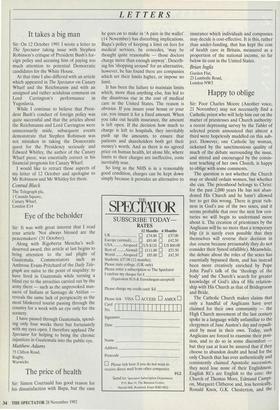The price of health
Sir: Simon Courtauld has good reason for his dissatisfaction with Bupa, but the case he goes on to make in 'A pain in the wallet' (14 November) has disturbing implications. Bupa's policy of keeping a limit on fees for medical services, he concedes, 'may be thought quite reasonable — those doctors charge more than enough anyway'. Describ- ing his 'shopping around' for an alternative, however, he has found there are companies which set their limits higher, or impose no limit.
It has been the failure to maintain limits which, more than anything else, has led to the disastrous rise in the cost of medical care in the United States. The reason is obvious. If you insure your house or your car, you insure it for a fixed amount. When you take out health insurance, the amount is left open. If the decision how much to charge is left to hospitals, they inevitably push up the amounts, to ensure that patients and shareholders both get their money's worth. And as there is no agreed price on human health, let alone life, where limits to their charges are ineffective, costs inevitably soar.
So long as the NHS is in a reasonably good condition, charges can be kept down simply because it provides an alternative to insurance which individuals and companies may decide is cost-effective. It is this, rather than under-funding, that has kept the cost of health care in Britain, measured as a proportion of the national income, so far below its cost in the United States.
Brian Inglis
Garden Flat, 23 Lambolle Road, London NW3










































































 Previous page
Previous page